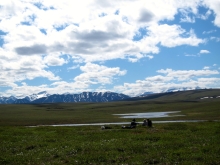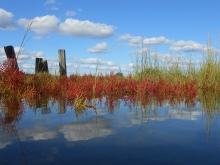Long-Term Ecological Research (LTER)
The National Science Foundation established the Long-Term Ecological Research (LTER) Network in 1980 to support research on long-term ecological phenomena in the United States. There are 28 LTER sites that represent diverse ecosystems and research emphases. The Ecosystems Center is participates two LTER projects: Arctic and Plum Island Ecosystems.
Arctic LTER
The long-term goal of Arctic LTER project is to understand and predict the effects of environmental change on arctic landscapes. To achieve this goal the Arctic LTER studies the ecology of the surrounding tundra, streams, and lakes. We hope to gain an understanding of the controls of ecosystem structure and function through long-term monitoring and surveys of natural variation of ecosystem characteristics, through experimental manipulation of ecosystems for years to decades and through synthesis of results and predictive modeling at ecosystem and watershed scales.
Plum Island Ecosystems LTER (PIE LTER)
The Plum Island Ecosystems LTER (PIE LTER), located in northeastern Massachusetts, is an integrated research, education and outreach program with the goal of developing a predictive understanding of the long-term response of watershed and estuarine ecosystems to changes in climate, land use and sea level and to apply this knowledge to the wise management and development of policy to protect the natural resources of coastal zones.

